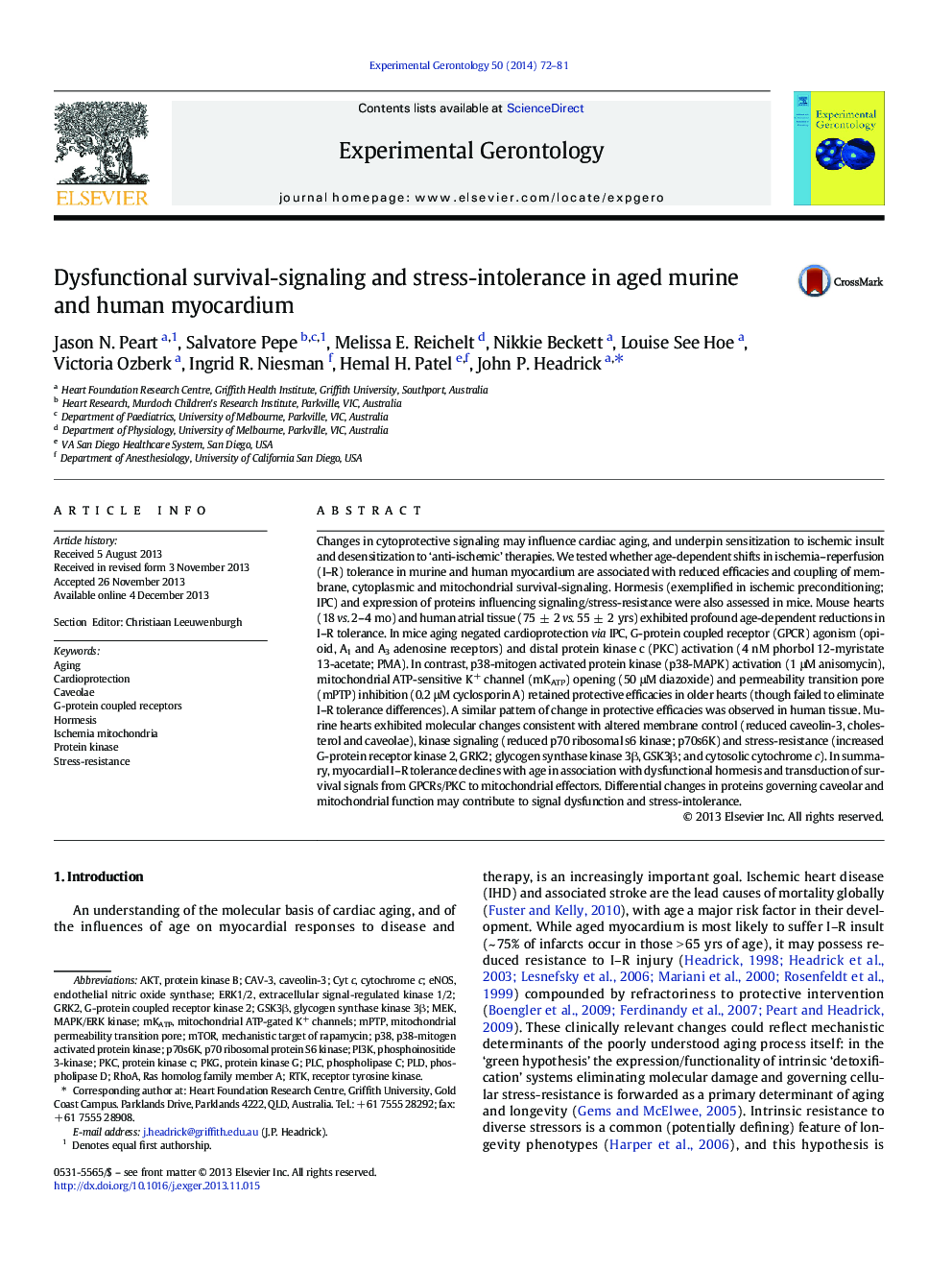| کد مقاله | کد نشریه | سال انتشار | مقاله انگلیسی | نسخه تمام متن |
|---|---|---|---|---|
| 8264649 | 1534891 | 2014 | 10 صفحه PDF | دانلود رایگان |
عنوان انگلیسی مقاله ISI
Dysfunctional survival-signaling and stress-intolerance in aged murine and human myocardium
ترجمه فارسی عنوان
علائم بیهوشی ناکارآمد و عدم تحمل استرس در ذهن قلب و قلب انسان
دانلود مقاله + سفارش ترجمه
دانلود مقاله ISI انگلیسی
رایگان برای ایرانیان
کلمات کلیدی
mKATPGSK3βstress-resistancePKCCyt CPKGPLCp38ras homolog family member AMPTPp70S6KeNOSGRK2PI3KPLDmTORRTKRhoAERK1/2 - ERK1 / 2G-protein coupled receptors - G-پروتئین گیرنده های متصل شدهMAPK/ERK kinase - MAPK / ERK kinasep70 ribosomal protein S6 kinase - P70 پروتئین ریبوزومی S6 کینازAkt - آکتmitochondrial permeability transition pore - انتقال نفوذی میتوکندری منفی استCardioprotection - حفاظت از قلبCaveolae - حفره غشاییAging - سالخوردگیendothelial nitric oxide synthase - سنتاز اکسید نیتریک اندوتلیالcytochrome c - سیتوکروم سیphospholipase C - فسفولیپاز CPhospholipase D - فسفولیپاز Dphosphoinositide 3-kinase - فسفینوزیتید 3-کینازMEK - مجاهدین خلقMechanistic target of rapamycin - هدف مکانیکی رپامایسینHormesis - هورمسیسProtein kinase - پروتئین کینازprotein kinase B - پروتئین کیناز Bprotein kinase G - پروتئین کیناز GProtein kinase C - پروتئین کیناز سیCav-3 - کاو-3Caveolin-3 - کاورولین-3extracellular signal-regulated kinase 1/2 - کیناز 1/2 تنظیم سیگنال خارج سلولیGlycogen synthase kinase 3β - گلیکوزین سنتاز کیناز 3βReceptor Tyrosine Kinase - گیرنده تیروزین کیناز
موضوعات مرتبط
علوم زیستی و بیوفناوری
بیوشیمی، ژنتیک و زیست شناسی مولکولی
سالمندی
چکیده انگلیسی
Changes in cytoprotective signaling may influence cardiac aging, and underpin sensitization to ischemic insult and desensitization to 'anti-ischemic' therapies. We tested whether age-dependent shifts in ischemia-reperfusion (I-R) tolerance in murine and human myocardium are associated with reduced efficacies and coupling of membrane, cytoplasmic and mitochondrial survival-signaling. Hormesis (exemplified in ischemic preconditioning; IPC) and expression of proteins influencing signaling/stress-resistance were also assessed in mice. Mouse hearts (18 vs. 2-4 mo) and human atrial tissue (75 ± 2 vs. 55 ± 2 yrs) exhibited profound age-dependent reductions in I-R tolerance. In mice aging negated cardioprotection via IPC, G-protein coupled receptor (GPCR) agonism (opioid, A1 and A3 adenosine receptors) and distal protein kinase c (PKC) activation (4 nM phorbol 12-myristate 13-acetate; PMA). In contrast, p38-mitogen activated protein kinase (p38-MAPK) activation (1 μM anisomycin), mitochondrial ATP-sensitive K+ channel (mKATP) opening (50 μM diazoxide) and permeability transition pore (mPTP) inhibition (0.2 μM cyclosporin A) retained protective efficacies in older hearts (though failed to eliminate I-R tolerance differences). A similar pattern of change in protective efficacies was observed in human tissue. Murine hearts exhibited molecular changes consistent with altered membrane control (reduced caveolin-3, cholesterol and caveolae), kinase signaling (reduced p70 ribosomal s6 kinase; p70s6K) and stress-resistance (increased G-protein receptor kinase 2, GRK2; glycogen synthase kinase 3β, GSK3β; and cytosolic cytochrome c). In summary, myocardial I-R tolerance declines with age in association with dysfunctional hormesis and transduction of survival signals from GPCRs/PKC to mitochondrial effectors. Differential changes in proteins governing caveolar and mitochondrial function may contribute to signal dysfunction and stress-intolerance.
ناشر
Database: Elsevier - ScienceDirect (ساینس دایرکت)
Journal: Experimental Gerontology - Volume 50, February 2014, Pages 72-81
Journal: Experimental Gerontology - Volume 50, February 2014, Pages 72-81
نویسندگان
Jason N. Peart, Salvatore Pepe, Melissa E. Reichelt, Nikkie Beckett, Louise See Hoe, Victoria Ozberk, Ingrid R. Niesman, Hemal H. Patel, John P. Headrick,
